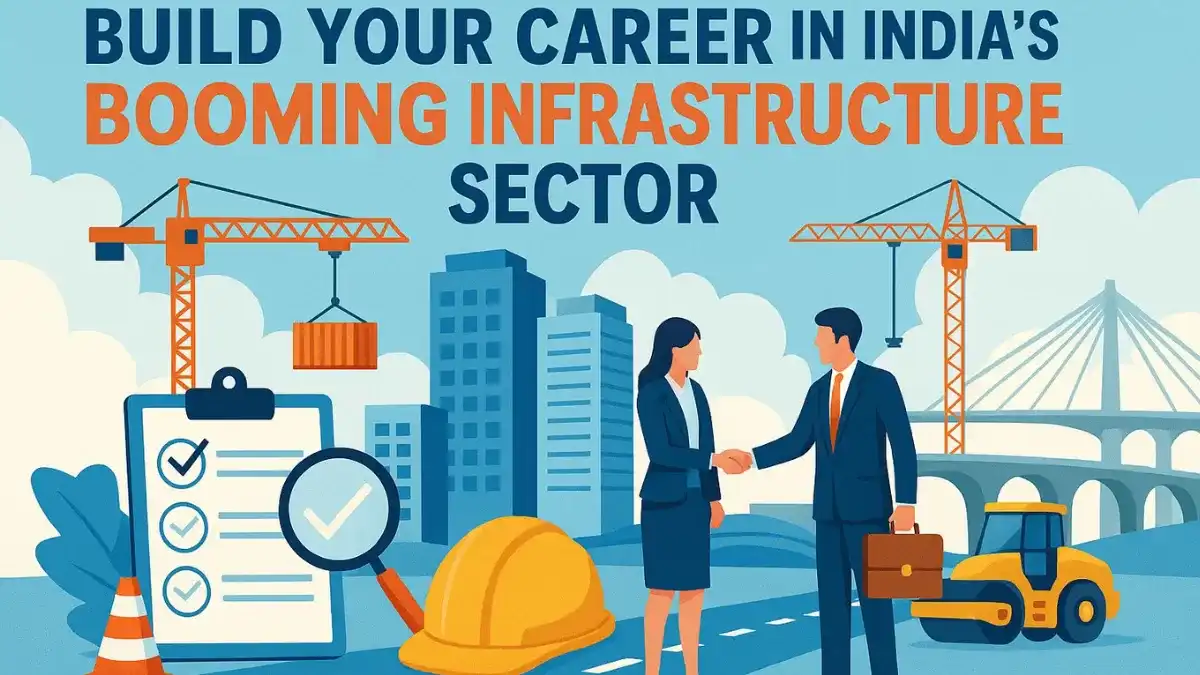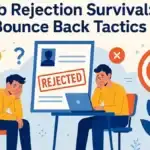## Building Your Career in India Booming Infrastructure Sector: Your Path to Stability and Growth
You’re scrolling through job portals again, feeling that familiar frustration. Maybe you’re a fresh engineering graduate in Mumbai sending out 50 resumes with no replies. Or a mid-career professional in Bangalore watching tech layoffs and wondering, “Is there a stable field where my skills actually matter?” What if I told you there’s a massive, growing industry right under your feet – literally? Think of the roads you drive on, the bridges you cross, the metro lines transforming your city. Recent events, like infrastructure challenges in Gujarat, remind us how crucial this sector is. But beyond the headlines lies a golden opportunity: India’s infrastructure boom is creating lakhs of new jobs, offering stability, purpose, and real career growth. Forget the saturated markets for a second. Let’s explore how you can build a rock-solid career while helping build India.
### Why Infrastructure is Your Secret Weapon in Today’s Job Market
Remember that new airport terminal in Mumbai or the sleek metro zipping through Pune? That’s not just concrete and steel; it’s job creation on a massive scale. The Indian government is pouring billions into projects like the National Infrastructure Pipeline and PM Gati Shakti. We’re talking highways, railways, smart cities, renewable energy plants – it’s everywhere! Why does this matter for your career? Simple: demand. While tech sees volatility, infrastructure needs are constant and growing. Companies are desperately hunting for skilled people – not just engineers, but project managers, safety experts, environmental specialists, data analysts, and skilled technicians. It’s a field where experience is gold, and your work leaves a lasting legacy in your city. Platforms like Digital Smart Careers track these trends, showing a 30% spike in infrastructure job postings in just the last year. This isn’t a passing trend; it’s the backbone of India’s growth story, and you can be part of it.
### The Surprising Range of Jobs You Haven’t Considered (Yes, Beyond Engineering!)
“But I’m not a civil engineer!” – sound familiar? That’s the biggest myth holding people back. Let’s break it down with real roles hiring right now:
- The Tech Whiz: Infrastructure isn’t old-school anymore. Think BIM (Building Information Modelling) specialists in Bangalore using 3D software to design smarter bridges, or IoT engineers in Chennai monitoring dam safety with sensors. Your coding or data skills? Highly valuable!
- The Green Champion: Every project needs environmental compliance experts. If you have a background in science or environmental studies, roles like Environmental Impact Assessor are booming. Imagine ensuring a new highway near Pune protects local ecosystems.
- The Safety Guardian: After any incident, the focus on safety skyrockets. Certified Safety Officers are in crazy demand. This role often starts with a diploma and offers quick progression. Your job? Making sure everyone goes home safe.
- The Project Maestro: Project Managers orchestrate everything – budgets, timelines, teams. You don’t always need an engineering degree; a PMP certification and solid organizational skills can open doors.
- The Skilled Craftsperson: Certified welders, electricians, heavy machine operators earn excellent pay. Government skill programs (like Skill India) offer low-cost, short-term training with near-guaranteed placement.
Rahul, a commerce graduate from Vadodara, felt stuck in low-paying jobs. He spotted an ad for a “Project Billing Coordinator” with a highway construction firm. With basic Excel skills learned online (thanks to a free module highlighted on Digital Smart Careers), he applied. Two years later, he’s managing contracts worth crores. The sector needs diverse talent.
### Getting Your Foot in the Door (No Family Connections Needed!)
Landing that first role feels tough, especially without a “reference.” Here’s your practical playbook, inspired by folks who made it happen:
- Leverage Free Government Schemes: The Skill India Mission (www.skillindia.gov.in) offers FREE or subsidized training in high-demand infrastructure trades (welding, crane operation, surveying). Centers are in most major cities. Complete a short course, get certified, and placement cells help you connect with companies.
- Start Small, Think Big: Look for roles with contractors or subcontractors on big projects. Positions like “Site Supervisor Trainee” or “Assistant Quality Checker” often require minimal experience but offer massive learning. Anjali in Mumbai started as a trainee documenting concrete pours. Within 18 months, she moved into quality control for a metro rail project.
- Upskill Strategically (and Cheaply): Focus on one high-value, affordable certification:
Role You Want Key Certification Where to Get It (Approx. Cost) Safety Officer NEBOSH IGC or OSHA 30-Hour Online platforms (₹15,000 – ₹30,000) BIM Modeller Autodesk Revit Certified User Autodesk Website/Authorized Centers (₹10,000 – ₹20,000) Project Scheduler Primavera P6 Fundamentals Oracle University/Online (₹12,000 – ₹25,000) - Network on the Ground (Not Just LinkedIn): Visit industry events hosted by groups like CIDC (Construction Industry Development Council). Connect with professionals on sites specifically for blue-collar and technical jobs like Apna App. A simple chat can lead to a site visit or trainee spot.
Digital Smart Careers often features webinars with infrastructure HR managers who confirm: showing genuine interest and basic certified skills trumps a generic degree any day. Prakash, a mechanic in Pune, took a weekend CNC machine operation course. He’s now operating advanced tunnelling equipment, earning triple his old salary.
### From Surviving to Thriving: Building Long-Term Growth
Getting the job is step one. Building a rewarding career is the marathon. Here’s how to climb steadily:
- Become the Solution Finder: Infrastructure projects are messy. Problems pop up daily – delayed materials, design clashes, unexpected ground conditions. The people who advance are those who propose solutions, not just report problems. Document your wins!
- Master the Money: Understand project costing and budgeting basics. Even if you’re not in finance, knowing how your work impacts the bottom line makes you invaluable. Ask your project manager if you can shadow budget reviews.
- Embrace Digital Tools: Learn the software your company uses (AutoCAD, MS Project, GIS tools). Free tutorials abound on YouTube. Being the “tech-savvy” person on site opens doors.
- Prioritize Safety Relentlessly: It’s not just a compliance box to tick. Championing safety saves lives and prevents disasters. This ethic gets noticed by top management. Certification updates (often funded by employers) are key.
Deepika, a site engineer in Bangalore, volunteered to learn drone surveying for her highway project. Her initiative led to faster surveys and less risk for ground staff. She was promoted within a year. Resources like Digital Smart Careers constantly emphasize how niche skills combined with initiative drive promotions in this sector.
### You’re Not Just Building Bridges, You’re Building Your Future
It’s easy to feel lost in the job market noise. But look around – the cranes dotting the skyline, the new expressways, the cleaner water projects. That’s not just development; it’s opportunity calling your name. The infrastructure sector offers something rare today: tangible work, essential skills, and the chance to literally shape your country’s future. Forget feeling like a replaceable cog. Here, your hands, your mind, your problem-solving skills build things that last generations. The recent focus on infrastructure safety isn’t just a wake-up call for engineers; it’s a siren song for anyone seeking a resilient, meaningful career path. The projects are funded. The jobs are waiting. Your time to build is now.
### Your Infrastructure Career Toolkit
FAQs (Answered Honestly!):
- Q: I don’t have an engineering degree. Can I still get a good job?
A: Absolutely! Roles in safety, surveying, equipment operation, quality control, administration, and environmental monitoring often require diplomas or specific certifications, not full degrees. Skill India programs are a great launchpad. - Q: Are site jobs only for men?
A: No! While still male-dominated, more women are thriving as site engineers, safety officers, environmental inspectors, project coordinators, and even heavy machine operators. Companies are actively seeking diversity. - Q: Is the pay good, especially starting out?
A: Starting salaries for trainees might be modest (₹15k-₹25k/month), but they rise quickly with skill and certification. Skilled technicians (certified welders, crane ops) can earn ₹40k-₹70k+. Project managers earn well into lakhs. - Q: Will AI take these jobs?
A: AI will change jobs (e.g., using drones for surveys), not eliminate them. Human oversight, problem-solving, safety management, and on-site decision-making are irreplaceable. Upskilling is your shield.
Must-Have Apps & Tools:
- Apna App: Fantastic for finding blue-collar, technical, and site-specific jobs across India. Connects you directly with contractors.
- NSC (National Safety Council) India App: Provides free safety guidelines, checklists, and updates – crucial knowledge for anyone on site.
- Skill India Portal (Web/Mobile): Your gateway to government-recognized training programs and placement assistance. Search for infrastructure-related courses.
5 Quick Tips You Can Do TODAY:
- Google “Infrastructure projects [Your City]“ (e.g., “Infrastructure projects Pune”). Identify 3 major ongoing projects near you.
- Visit the Skill India website. Spend 10 minutes browsing courses under “Construction” or “Capital Goods.” Find one that sparks interest.
- Update your LinkedIn. Add keywords like “Infrastructure,” “Project Support,” “Site Operations,” or “Safety Awareness” based on your skills/target role. Set job alerts.
- Watch one free YouTube tutorial on a relevant skill (e.g., “Primavera P6 basics,” “Construction safety fundamentals,” “AutoCAD for beginners”).
- Reach out to ONE person. Message someone on LinkedIn working in infrastructure (even loosely connected). Ask: “What’s one skill you wish you had when starting?”
The foundation for your next career move isn’t found in endless scrolling; it’s built by taking one small, deliberate step. Start laying your bricks today. Your future in building India awaits.






